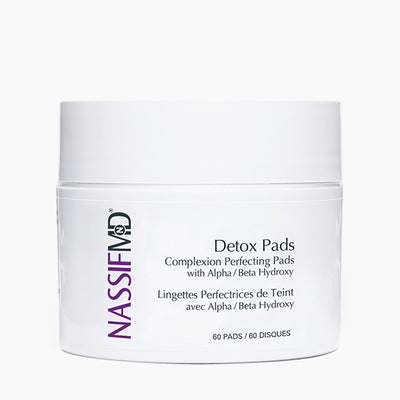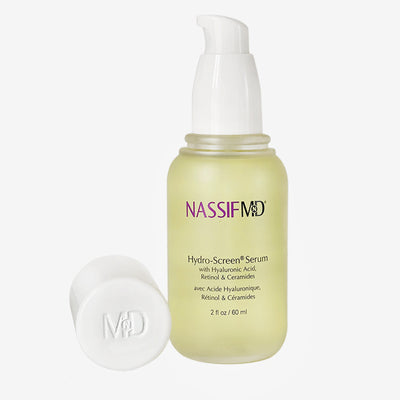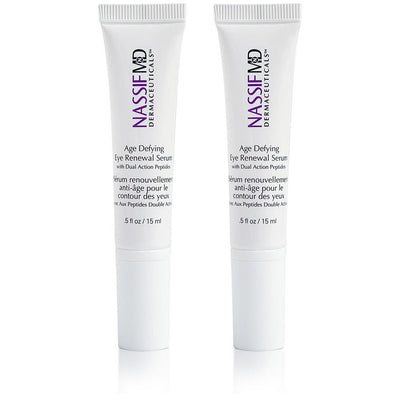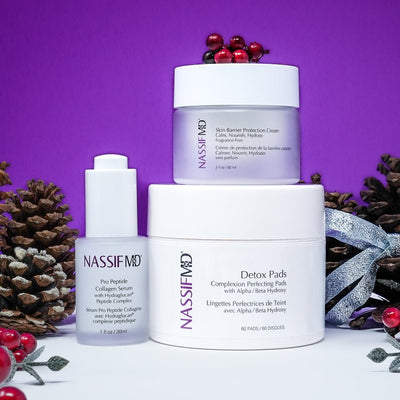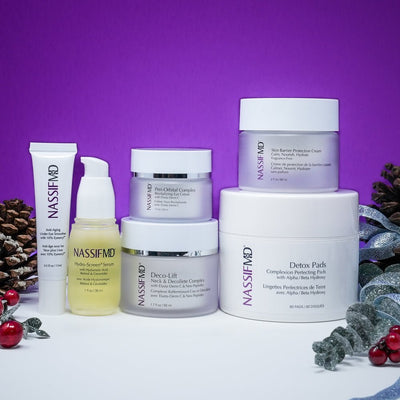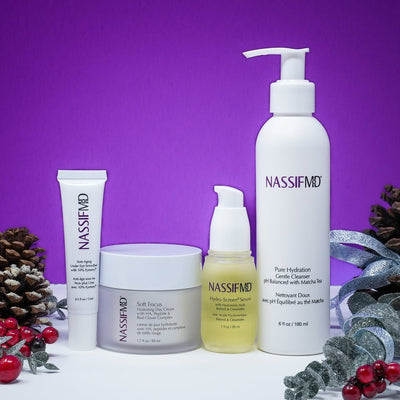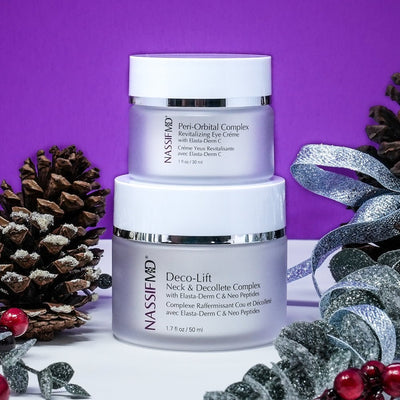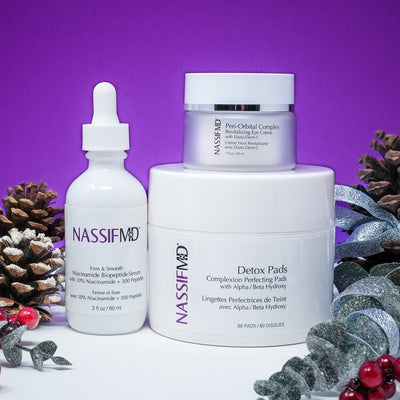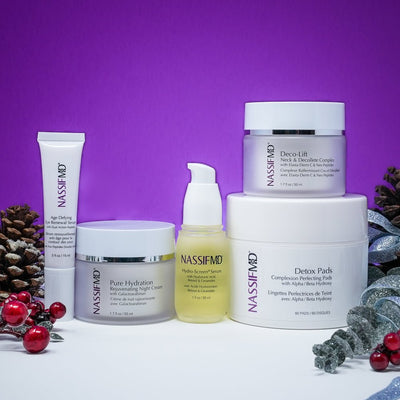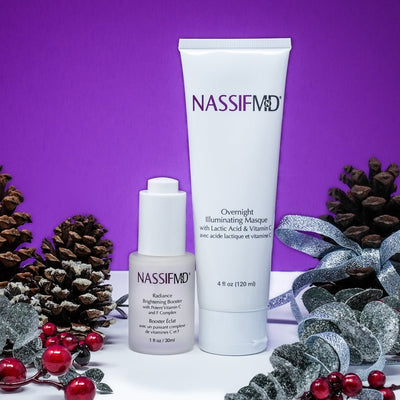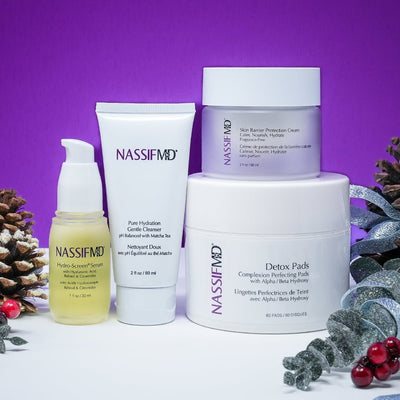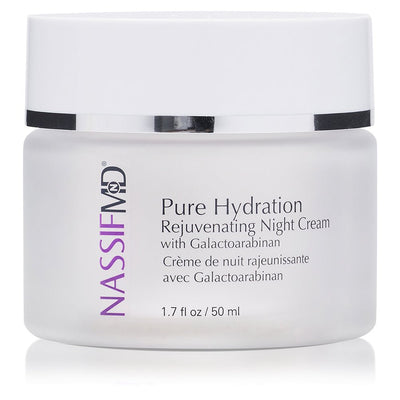5 Winter Skincare Tips to Try this Season from a Plastic Surgeon
5 Winter Skincare Tips to Try this Season from a Plastic Surgeon
If you are wondering why does my skin look so bad in the winter, you are in the right place. Colder, dryer air outside and hot, dry air inside means your skin needs more hydration. Winter skincare looks different from your summer strategies to prevent dry, wrinkled, irritated, chapped, and cracked skin.
Keep reading to learn about skincare for winter from the perspective of a facial plastic surgeon who understands skin structure and hydration from the inside out. Plus, use medical spa quality products to make these skincare tips practical, enjoyable, and effective.
Keep reading to learn more about the five winter skincare tips:
- Add humidity to the dry environment
- Choose moisturizing ingredients like hyaluronic acid, ceramides, and shea butter
- Stick with a SPF moisturizer
- Adjust the use of retinol and AHAs
- Use an occlusive moisturizer before bed
Winter Skincare Essentials
With a few adjustments, your winter skincare routine will take you from dull and dry to hydrated and radiant skin in winter. Let’s dive into Dr. Nassif’s five winter skin tips.
Invest in a Humidifier
In many places, along with the change in seasons comes a drop in humidity. Indoor humidity can fall even lower than outdoor humidity because of heaters.
Use a humidifier to increase indoor humidity, one of the best ways to keep skin hydrated in the winter. Running a humidifier in the bedroom at night also helps keep your sinus passages hydrated.
Monitor indoor humidity with a goal of 30-50%. If your humidity gets too high, it can encourage mold growth.
Look for Skincare Products with Moisturizing Ingredients
The next skincare tip is to look for specific hydrating and moisturizing ingredients, including hyaluronic acid, ceramides, and shea butter. These ingredients are the best moisturizers for dry skin.
Hyaluronic Acid
Hyaluronic acid is a natural polysaccharide that makes up the fluid between cells (extracellular matrix) in the skin. It draws water into the skin and holds it that, making it one of the most hydrating ingredients for your skin.
Using hyaluronic acid serum plumps and hydrates the skin, decreases the appearance of fine lines, and promotes skin regeneration. Hyaluronic acid has immediate and long-term hydrating benefits to the skin, as measured in clinical trials.
Hyaluronic acid is efficient and safe to use; it’s a must-have ingredient for cold-weather skincare. Read more about hyaluronic acid benefits here.
Ceramides
A ceramide product is another essential in your skincare routine. Ceramides are lipids that provide structure to the skin and support the skin barrier. A strong skin barrier is vital for hydrated skin as it keeps the water in, minimizing transdermal water loss.
Ceramides in the skin also help prevent dermatologic issues, like eczema, which tend to worsen in cold, dry winter weather.
NassifMD® Hydro-Screen Hydrating Serum is a must-have product for winter skincare, but you can utilize the benefits year-round. This serum offers a synergy of active ingredients, primarily hyaluronic acid and ceramides, to plump, hydrate, and restore the skin, even in the harshest conditions.
Shea Butter
Dry, dehydrated skin appears wrinkled and crepey (like crepe paper), but shea butter works to reverse the crepey appearance.
Shea butter is a natural fat from the nut of the Shea tree that grows in Africa. It’s rich in fatty acids, antioxidants, and antimicrobial compounds to nourish, hydrate, and protect the skin.
Shea butter is the primary ingredient in NassifMD® Crepe Inhibitor Triple Action Body Butter, which you can use on your body instead of lotion in the winter months as a deep moisturizer for dry skin. Dr. Nassif also designed this product to improve elasticity and slow the aging process.
Stick with SPF Lotions
Just because it is winter doesn’t mean you get to retire your moisturizer with SPF. Your skin is still exposed to ultraviolet radiation in the winter, primarily UVA rays, which can accelerate aging and dry your skin even more.
The best dry skin moisturizer for daytime is one that includes sunscreen. You’ll love NassifMD® Protect & Hydrate Daily Mineral Sunscreen with SPF 44, hyaluronic acid, and a potent vitamin C to protect and hydrate your winter skin. Try it: you’ll think it’s the best facial sunscreen.
Scale Back AHA and Retinoid Use
Alpha hydroxy acids (AHAs) and retinoids are antiaging ingredients that promote cellular turnover and rejuvenate the skin.
AHAs are natural exfoliating compounds derived from plants; examples include glycolic acid and lactic acid, which you may find in exfoliating cleansers and masks. They work to remove dead skin cells, unclog pores, and improve the skin’s appearance.
Retinoids, including retinol, are popular skincare ingredients targeting aging skin to reduce wrinkles, promote an even skin tone, improve hydration, and slow the aging process.
The best skincare routine for winter doesn’t exclude these helpful ingredients. The tip is to pay attention to your skin as the seasons shift, notice how your skin feels, and adjust your use of hydroxy acids and retinol if needed. Some people will benefit from less frequent use of these products in the winter or diluting by adding a small amount to another skincare product.
Lock in Moisture with Occlusives (Ideally Before Sleeping)
Occlusives are oils and waxes (like beeswax and seed oils) that form a barrier over the skin’s surface to prevent water loss, improve absorption of other skincare products, and protect the skin from the external environment. Just as you’d use an SPF moisturizer during the day, use an occlusive product as the last step of your nighttime skincare routine in the winter.
Applying an occlusive is called skin slugging and helps maintain the skin barrier and rehydrate and protect the skin. NassifMD® Skin Barrier Balm is the perfect occlusive for maintaining winter skin health.
Forget dermatologist-recommended skincare and choose NassifMD® facial plastic surgeon skincare for effective formulas with a synergy of active ingredients born from a profound understanding of skin health.
Your winter essential skincare includes:
- NassifMD® Hydro-Screen Hydrating Serum
- NassifMD® Crepe Inhibitor Triple Action Body Butter
- NassifMD® Protect & Hydrate Daily Mineral Sunscreen
- NassifMD® Skin Barrier Balm
Use these five skincare tips to help you adjust your winter skincare routine for hydrated, revitalized, and beautiful skin. And share with your friends!
References
- Juncan, A. M., Moisă, D. G., Santini, A., Morgovan, C., Rus, L. L., Vonica-Țincu, A. L., & Loghin, F. (2021). Advantages of Hyaluronic Acid and Its Combination with Other Bioactive Ingredients in Cosmeceuticals.Molecules (Basel, Switzerland), 26(15), 4429.
- Robinson, D. M., Vega, J., Palm, M. D., Bell, M., Widgerow, A. D., & Giannini, A. (2022). Multicenter evaluation of a topical hyaluronic acid serum .Journal of cosmetic dermatology, 21(9), 3848–3858.
- Borodzicz, S., Rudnicka, L., Mirowska-Guzel, D., & Cudnoch-Jedrzejewska, A. (2016). The role of epidermal sphingolipids in dermatologic diseases. Lipids in health and disease, 15, 13.
- Abdel-Razek, A. G., Abo-Elwafa, G. A., Al-Amrousi, E. F., Badr, A. N., Hassanein, M. M. M., Qian, Y., Siger, A., Grygier, A., Radziejewska-Kubzdela, E., & Rudzińska, M. (2023). Effect of Refining and Fractionation Processes on Minor Components, Fatty Acids, Antioxidant and Antimicrobial Activities of Shea Butter. Foods (Basel, Switzerland), 12(8), 1626.
- Tran, D., Townley, J. P., Barnes, T. M., & Greive, K. A. (2014). An antiaging skin care system containing alpha hydroxy acids and vitamins improves the biomechanical parameters of facial skin. Clinical, cosmetic and investigational dermatology, 8, 9–17.
- Zasada, M., & Budzisz, E. (2019). Retinoids: active molecules influencing skin structure formation in cosmetic and dermatological treatments. Postepy dermatologii i alergologii, 36(4), 392–397.


